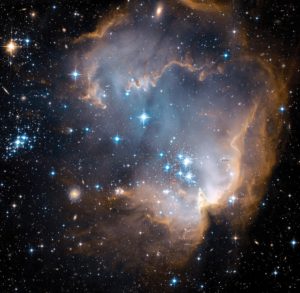Finding Awe in the Complexity of the Universe
 NASA, ESA and the Hubble Heritage Team
NASA, ESA and the Hubble Heritage Team I am a Humanist.
I have been associated with liberal religion since about age eighteen, which is about eighty percent of my life. My mother spent some time as a foster child in a Unitarian minister’s home. As a result, my sister and I had early contact with the Unitarian philosophy. There was no Unitarian church or fellowship in the towns where I grew up but when I went to college I easily found a Unitarian church with a college-age group. As the Unitarian movement achieved a larger following, my parents finally helped found a Unitarian fellowship in their hometown. My sister was similarly inclined and became a UU later with her husband and family. My biological children started their religious education in the Oak Ridge Unitarian-Universalist Church, where I have been a member since 1965. We now have a small humanist discussion group there.
Humanism came later in my life and is presently my main source of inspiration, study, and consideration. Most human activities are due to the necessities of staying alive, eating, procreating, child raising, etc. and are not necessarily governed by cerebral activity. They, however, can be augmented by thinking and other cognitive behavior. For example, love is a very human behavior and certainly not directly guided by thinking, but is nevertheless, very important to the maintenance of our health and positive outlook on life. Love is as important to humanists as it is to any other human endeavor or activity.
In my study of nature as a physicist, I have been awed with the size and complexity of the universe and all of its laws. The known physical laws are a constant source of marvel to me. The various aspects of the known universe are so overwhelming that I’m incredulous that anyone would attribute its creation to any of the little gods conceived of by humans. These gods and their religions were all created at a time when humans had not yet achieved any significant reasoning power or knowledge of the true nature of the universe and lacked the ability to do meaningful tests of their environment. In past millennia, humans have achieved large and powerful civilizations, but in the process have done great damage to our planet through destructive industrial and agricultural practices. Part of this damage was due to various oppressive, authoritative, and demanding religions, many of which are constantly in conflict with each other. Such conflicts are neither necessary nor helpful and do not aid anyone, even their own followers. If the energy that went into all the religious conflicts over the centuries could have been channeled into education and science, we would have a much better world.
My concern is for the betterment and improvement of the health, freedom, and spirit of mankind as well as the need for improved living conditions and alternative energy sources, and protection of the only planet we know. I believe that humanity must become more rational and reject the damaging aspects of the superstitions and religions it has created. Humanism can help the world become more rational. I think that our main concerns should be the improvement of mankind closely coupled with protection of the environment—such as from threats like climate change—without which we cannot survive.
We all have our own stories of how we came to be humanists, and we want to hear yours! Fill out the form here to be featured in this series.
